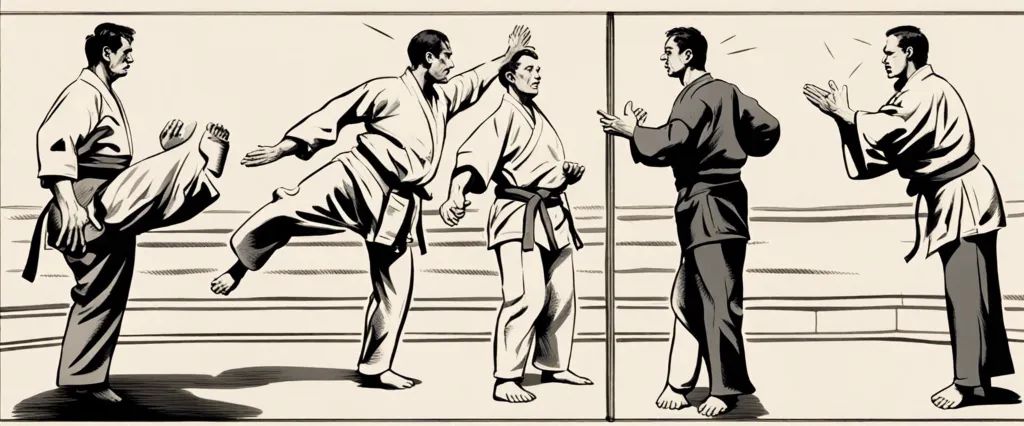
Chapter 1 What's Book Verbal Judo by George J. Thompson
"Verbal Judo" by George J. Thompson is a book about the art of using conversation and communication skills to diffuse difficult situations and gain cooperation from others. It provides practical strategies and techniques for effectively managing conflict, dealing with aggressive or difficult individuals, and improving overall communication in both personal and professional relationships. The book emphasizes the power of words and how they can be used to de-escalate tense situations and achieve positive outcomes.
Chapter 2 Is Book Verbal Judo A Good Book
Many readers have found "Verbal Judo" by George J. Thompson to be a helpful and informative book. It offers practical strategies for defusing conflict and improving communication in a variety of situations. If you are interested in learning how to better handle difficult conversations and navigate potentially confrontational interactions, this book may be a valuable resource for you. Ultimately, whether or not it is a good book will depend on your personal preferences and needs.
Chapter 3 Book Verbal Judo by George J. Thompson Summary
Verbal Judo by George J. Thompson is a comprehensive guide to effectively communicating and defusing tense situations using verbal techniques. The book emphasizes the importance of listening and understanding the other person's perspective in order to prevent conflicts from escalating.
Thompson introduces the concept of "verbal judo," which involves using words as a tool to redirect negative energy and create a more positive outcome. He provides practical tips and strategies for handling difficult conversations, dealing with difficult people, and diffusing potentially volatile situations.
Throughout the book, Thompson emphasizes the power of words and the impact they can have on communication and relationships. By mastering the art of verbal judo, individuals can improve their communication skills, build better relationships, and navigate conflict more effectively.
Overall, Verbal Judo is a valuable resource for anyone looking to improve their communication skills and handle difficult situations with more grace and effectiveness.

Chapter 4 Book Verbal Judo Author
George J. Thompson, also known as "Doc Rhino," was a former English professor and black belt martial artist who became a renowned expert on verbal communication and conflict resolution. He released the book "Verbal Judo: The Gentle Art of Persuasion" in 1993.
Apart from "Verbal Judo," Thompson also wrote several other books on the topics of communication and conflict resolution, including "Verbal Judo: Redirecting Behavior with Words," "Verbal Judo: The Gentle Art of Persuasion Workbook," and "The Verbal Judo Way of Leadership."
In terms of editions, the original "Verbal Judo" book is widely regarded as the best and most comprehensive work by Thompson. It has been highly acclaimed and widely used by law enforcement agencies, executives, and individuals looking to improve their communication skills and navigate conflicts effectively.
Chapter 5 Book Verbal Judo Meaning & Theme
Book Verbal Judo Meaning
"Verbal Judo" is a book written by George J. Thompson, a former English professor and martial arts expert. The book explores the concept of using words and communication techniques effectively to diffuse conflicts, de-escalate situations, and achieve mutually beneficial outcomes in difficult or confrontational interactions. It teaches readers how to communicate assertively, listen actively, and respond strategically in challenging situations, ultimately helping them become more effective communicators and negotiators. The term "verbal judo" refers to the idea of using verbal skills as a form of self-defense and diplomacy, rather than physical force, to navigate conflict and achieve positive outcomes.
Book Verbal Judo Theme
The central theme of Verbal Judo by George J. Thompson is the power of effective communication, specifically in conflict resolution and tactical communication. The book emphasizes the importance of using words to de-escalate potentially volatile situations, diffuse aggression, and assert control in tense interactions. Through various tactics and strategies outlined in the book, Thompson highlights how individuals can use verbal skills to navigate confrontations, build rapport, and achieve positive outcomes in challenging circumstances. Ultimately, the theme of Verbal Judo is about harnessing the power of words to achieve cooperation, understanding, and resolution in conflicts.
Chapter 6 Other Accessible Resources
- Verbal Judo on Amazon.com: A popular online marketplace where you can purchase the book in various formats.
- Verbal Judo on Goodreads: A platform for book lovers to rate and review books, including Verbal Judo.
- Verbal Judo on Audible: An audiobook platform where you can listen to an audio version of Verbal Judo.
- Verbal Judo summary on Blinkist: A platform that provides summaries of non-fiction books, including Verbal Judo.
- Verbal Judo on YouTube: Videos discussing the concepts and principles outlined in the book.
- Verbal Judo reviews on Book Depository: A website where users can rate and review books, including Verbal Judo.
- Verbal Judo discussion on Reddit: A forum where users can discuss the book and share insights on its teachings.
- Verbal Judo quotes on Pinterest: An online pinboard where users curate and share quotes from the book.
- Verbal Judo profile on LinkedIn: A professional networking platform where you can connect with others who have read and implemented the teachings of Verbal Judo.
- Verbal Judo on Google Books: A platform where you can preview and purchase the digital version of the book.

Chapter 7 Quotes of Book Verbal Judo
Book Verbal Judo quotes as follows:
- "Words are singularly the most powerful force available to humanity. We can choose to use this force constructively with words of encouragement, or destructively using words of despair. Words have energy and power with the ability to help, to heal, to hinder, to hurt, to harm, to humiliate, and to humble."
- "Verbalization is a reflection of your thinking process. If you do not take control of what you say, the chances are you will not take control of your thoughts either."
- "Remember that a person’s name is to that person the sweetest sound in any language."
- "In every confrontation, we have two options: to react with emotions or to respond with reason. It is our choice."
- "Words cannot be unsaid, actions cannot be undone. Take great care in what you say and do, as you may never be able to fully repair the damage caused."
- "The ability to redirect focus in a conversation can be a powerful tool. Disengaging from conflict and steering the conversation towards a more positive direction can help resolve tensions."
- "Being a good listener is just as important, if not more so, than being a good talker. Listening shows respect and understanding, and can defuse volatile situations."
- "Never underestimate the power of a sincere apology. Acknowledging your mistakes and taking responsibility for them shows humility and can mend relationships."
- "Sometimes the best response is no response. Not every battle is worth fighting, and sometimes silence can speak louder than words."
- "Verbal judo is not about winning arguments or dominating others. It is about using words effectively to defuse conflicts, build rapport, and achieve positive outcomes in communication."
Chapter 8 Similar Books Like Book Verbal Judo
- "The Alchemist" by Paulo Coelho - Similar to "The Monk Who Sold His Ferrari," this book follows a spiritual journey of self-discovery and personal growth.
- "Siddhartha" by Hermann Hesse - Another book that explores themes of spiritual enlightenment and inner peace, this novel is a classic in the genre of self-discovery.
- "The Power of Now" by Eckhart Tolle - This book offers practical advice on how to live in the present moment and find true happiness and fulfillment.
- "Mindset: The New Psychology of Success" by Carol S. Dweck - In this book, the author explores the power of mindset and how our beliefs about our abilities can greatly impact our success in life.
- "Man's Search for Meaning" by Viktor Frankl - This powerful memoir and psychological exploration delves into the author's experiences in a concentration camp and how he found meaning and purpose in even the most difficult circumstances.